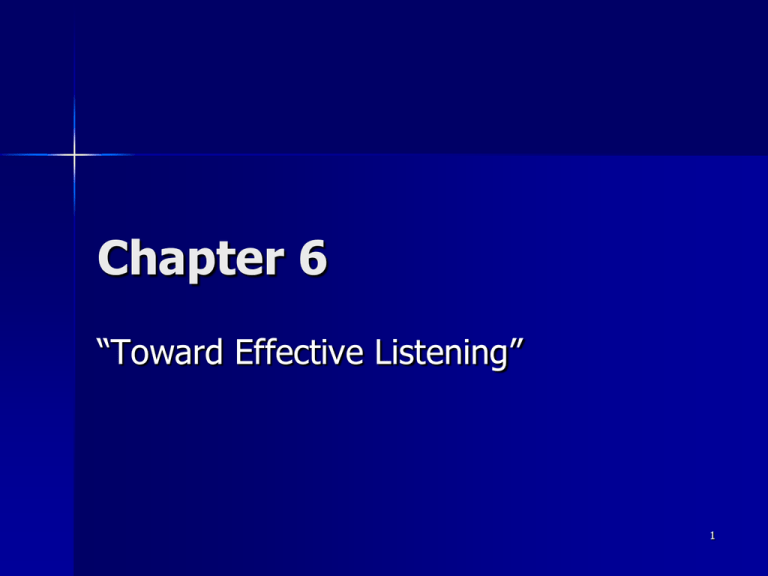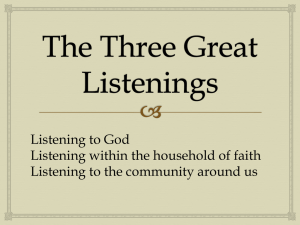Chapter 6 - Ector County Independent School District
advertisement

Chapter 6 “Toward Effective Listening” 1 Topics of Discussion Why learn about listening Effectiveness Time spent Areas affected Misconceptions Process Factors affecting listening Using feedback to analyze listening Kinds of listening/goals 2 Section 1 “Understanding the Listening Process” 3 Why Learn About Listening? 4 Most used communication skill Least taught Least understood Assumed to develop naturally Training is generally negative 5 Effectiveness Immediate = ½ 8 hours later lose 1/3 to ½ Retain only 25% of original 6 Time Spent Writing 9% Reading 16% Talking 30% Listening 45% 7 Areas Affected School Relationships Social groups and organizations Public dialogue Workplace Safety 8 Misconceptions 9 Listening and hearing are the same Hearing is a physical first step in the listening process, but it doesn’t imply understanding 10 Listening is easy or automatic It is complex and requires energy, effort, and skill 11 Listening develops naturally Consists of learned skills and behaviors that can be learned, relearned, improved, and refined 12 Anyone can listen well if they really try You can exert effort, but you may not be able to listen effectively if you lack the skills or noises can not be overcome 13 The speaker is responsible for the message and success of communication Speaker and listener share responsibility Listener may have to compensate for speaker’s lack of skill 14 If that’s what you heard, that’s what was said Listeners can’t assume they heard correctly and should use perception checks 15 Attitude and listening are unrelated It’s an important factor in listening and retaining information 16 People remember most of what they hear Listening and remembering are related, but failure to remember may not be due to faulty listening 17 Process: 18 Acquiring 1. 2. 3. 4. Pick up stimulus with senses (hearing) Outer ear acts as antennae and picks up sound waves Relayed to middle ear and amplified Passed to inner ear and transforms acoustical energy to electrical impulses Relayed to brain for processing 19 Acquiring 1. 2. 3. Differences distinguishing Different sound Levels of volume Higher and lower pitches 20 Acquiring 1. Noise and barriers Loud noises Interfere Can cause hearing loss 21 Acquiring 1. 2. 3. 4. 5. 6. Noise and barriers Repeated doses of some antibiotics Chronic ear infections Conflicting auditory and visual data Distracting physical movements Harsh or irritating voice Attitude and emotions 22 Attending 1. Choice – not automatic Selective perception – – – – Needs Interests Attitude Knowledge 23 Attending 1. 2. 3. 4. 5. 6. Improving skills Evaluate – determine importance Adjust attitude Focus energy on message/ turn off other thoughts Determine what can be gained with focus Ignore distractions Maintain concentration 24 Understanding 1. Decode Steps – Listen carefully – Filter based on experiences 25 Understanding 1. Decode Strategies – Build vocabulary – Use perception checks – Assume responsibility instead of expecting others to adjust 26 Understanding 1. 2. Interpret Self-talk/tell yourself what speaker is saying Goes through filter system – Feelings and needs 3. Perception check – Ask questions before finalizing 27 Understanding 1. 2. 3. 4. Strategies Check filter system Ask “Is this what they are really saying or just what I’m hearing?” and “Am I overlooking any alternatives?” Ask for more information before finalizing interpretation Take responsibility for interpretations and remain open, flexible, will to adapt and adjust 28 Understanding Respond Emotional – how do you feel about it Intellectual – what do you think about it Analyze and evaluate your response to the message Encode choices to say or do 29 Understanding Skills Monitor, analyze and evaluate Consider possible alternatives Decide what’s appropriate – balance rewards/consequences Take responsibility Consider all responses and provide constructive, realistic feedback Choose clear words 30 Factors Affecting Listening 31 Factors Affecting Listening Noise Barriers 32 Factors Affecting Listening 1. Memory Not always straightforward – can be selective – Choose what to remember – Remember only as we wish to – Eliminate or suppress certain memories 33 Factors Affecting Listening 2. Memory Types – Immediate – Long-term – Short-term 34 Factors Affecting Listening 3 Memory Skills – – – – – Concentrate as you receive messages Use calendars, lists or notes Summarize, rehearse, repeat or write info to seal it into memory Form mental associations and organize into related clusters Learn new info in small portions – don’t cram 35 Using Feedback to Analyze Listening 36 Using Feedback to Analyze Listening 1. 2. 3. Inappropriate feedback Cannot or did not hear correctly Listener lacks verbal decoding skills Interpreted as unrelated, uninteresting, offensive or irrelevant 37 Section 2 “Developing Listening Skills 38 Types of Listening Active Listening Process is transactional 1. Active = better grades than passive 2. = more enjoyment and info, rewards 3. = make fewer mistakes, have better performance, higher productivity and increased value as employees 39 Types of Listening Passive listening Try to absorb with no transaction Easily bored, distracted, give negative nonverbal feedback Generally no rewards Place responsibility on speaker Lazy listening Produces boredom, apathy, lack of interest 40 Types of Listening Impatient listening Pay attention in short bursts due to noise interruptions Make mistakes by forgetting details or instructions Give V & NV cues at inappropriate times Masks lack of concentration or interest 41 Types of Listening Impatient listening Types 1. Anticipatory/anticipates what will be said and plans response 2. Defensive/goal is to argue or disagree 3. Combative/goal is to win or put down 4. Distracted/pays attention to first, assumes what will be said, starts thinking about something else 42 Goals for Listening Critical 43 Goals for Listening Critical Skills 1. Identify goal or purpose 2. Gather info beforehand to build vocabulary 3. Focus on V and NV messages 4. Organize info to grasp main idea and supporting details 5. Use perception checks 6. Consciously store into memory bank 7. Ask questions, give feedback, take action 44 Goals for Listening Deliberative 45 Goals for Listening Deliberative Skills 1. Identify goal or purpose 2. Gather info beforehand as basis for judgment 3. Listen specifically to evaluate 4. Identify supporting info and use of emotional appeal 46 Goals for Listening Deliberative Skills 1. Observe V & NV cues to evaluate attitudes and feelings. Determine if they support or conflict 2. Analyze motivation or intent 3. Reflect on your responses 4. Give feedback – delay action if needed 5. Reserve judgment if unsure of facts 6. Make decision when info is sufficient 47 Goals for Listening Empathic 48 Goals for Listening Empathic Skills 1. Observe NV to analyze feeling speaker has for listener and context 2. Monitor understanding of speaker, message and situation 3. Analyze own responses, biases, prejudices and feeling toward speaker, message or context 4. Use perception checks 5. Paraphrase 6. Ask questions to help speaker clarify meaning 49 Goals for Listening Appreciative 50 Goals for Listening Appreciative Listen for fun, to imagine or extend creativity Most often used in social situations Used to relax or escape everyday stress Can inspire and provide personal growth 51 Goals for Listening Appreciative Skills to listen for enjoyment 1. Consider experiences to expand knowledge 2. Investigate styles, formats, etc 3. Be familiar with background or critiques of performers 4. Avoid distractions 5. Avoid judgment until performance is complete 6. Respond appropriately to ideas, feelings and skills of performers 7. Give appropriate feedback 52 Using the Four Goals Identify goal needed for situation Set goal Consider relationship with others Use memory technique Keep an open mind Be interactive 53 What This Means to You Listening isn’t easy or automatic. It takes effort and hard work. You have to set goals, and choose your style. The rewards for listening are great; the consequences of not listening can be fatal. 54





